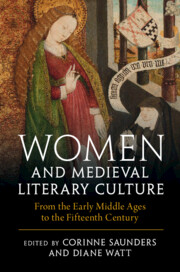Book contents
- Women and Medieval Literary Culture
- Women and Medieval Literary Culture
- Copyright page
- Contents
- Illustrations
- Contributors
- Acknowledgements
- Introduction
- I Patrons, Owners, Writers, and Readers in England and Europe
- II Circles and Communities in England
- III Health, Conduct, and Knowledge
- Chapter 7 Embracing the Body and the Soul
- Chapter 8 Gender and Class in the Circulation of Conduct Books
- Chapter 9 Women’s Learning and Lore
- Chapter 10 Women and Devotional Compilations
- IV Genre and Gender
- V Women as Authors
- General Index
- Index of Manuscripts
- References
Chapter 8 - Gender and Class in the Circulation of Conduct Books
from III - Health, Conduct, and Knowledge
Published online by Cambridge University Press: 28 July 2023
- Women and Medieval Literary Culture
- Women and Medieval Literary Culture
- Copyright page
- Contents
- Illustrations
- Contributors
- Acknowledgements
- Introduction
- I Patrons, Owners, Writers, and Readers in England and Europe
- II Circles and Communities in England
- III Health, Conduct, and Knowledge
- Chapter 7 Embracing the Body and the Soul
- Chapter 8 Gender and Class in the Circulation of Conduct Books
- Chapter 9 Women’s Learning and Lore
- Chapter 10 Women and Devotional Compilations
- IV Genre and Gender
- V Women as Authors
- General Index
- Index of Manuscripts
- References
Summary
This essay focuses on what may seem an ideologically narrow genre: the conduct book, offering a broad and complex interpretation of the texts and their place in medieval culture. Ashley ranges across European examples, especially French works that were later translated into English, beginning with the celebrated early example of the book written by Dhuoda, a Carolingian noblewoman for her son. Louis IXߣs Enseignemenz (Teachings), by contrast, provided advice for both his son and daughter. In the fourteenth and fifteenth centuries, the readership of conduct books expanded to include the middle classes. The conduct works of Christine de Pizan illustrate the growing popularity of the genre, reflecting an assumption that the lower classes will learn from the examples set by aristocratic women. Ashley demonstrates the appeal to a wider readership of the late-fourteenth-century book of Geoffrey de la Tour Landry, written for his three daughters and focused on marriage rather than life at court, while, in the same period, Le Menagier de Paris provides an example of a work addressed to a bourgeois audience that anticipates the development of ߢhousehold anthologiesߣ.
Keywords
- Type
- Chapter
- Information
- Women and Medieval Literary CultureFrom the Early Middle Ages to the Fifteenth Century, pp. 160 - 178Publisher: Cambridge University PressPrint publication year: 2023

